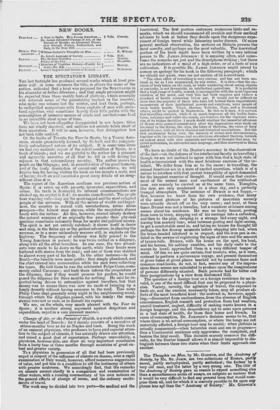THE SPECTATOR'S LIBRARY.
THE last fortnight has produced several works which at least pro- mise well : in some instances the title, in others the name of the author, indicated that a treat was prepared for the SPE CTATOR in his character of helluo librorurn ; and that ample provision might be expected from these weekly feats of gluttony, which assuredly will astonish some of the painstaking readers in the country, who make one volume last the winter, and lead them, perhaps, to undignified comparison with those exploits of men with unna- tural appetites, who sometimes horrify their little public with the . consumption of immense masses of crude and unwholesome food in an incredible short space of time. We have not been altogether disappointed in our hopes : titles have not wholly deceived; and authors not entirely fallen short of their reputation. It will be seen, however, that anticipation has not been fully realized. Of the books of Travels, the Year in Spain, by a Young Ame- rican, stands prominently forward, by its bulk and the compara- tively unhackneyed nature of its subject. It is some time since we had any accurate report of the social condition of Spain, in a book of travels ; and we are grateful to the author for a pleasant and agreeable narrative of all that he fell in with during his sojourn in that extraordinary country. The author avows his youth on the titlepage ; and, in consideration of his good humour, and of the lively description of occasional adventures, we will forgive him for having written his book on too minute a scale, and of having dwelt on and recorded a great many details of an insig- nificant char:. e'er.
The report of the American confirms our previous notion of Spain : it is eaten up with poverty, ignorance, superstition, and crime. Its trade is destroyed, its internal communications are choked up, its capital is fled ; its monks alone flourish. The people bear starving welt—they are the most ragged and the most resigned people of the universe. With all the means of wealth and happi- ness, the country is cursed with wretchedness, crime alone prospers—the honest man starves, while the magistrate shares booty with the robber. All this, however, cannot utterly destroy the natural energies of an originally fine people: their physical qualities sometimes indemnify them for moral and political misery. The spirit is not yet entirely subdued : it shows itself in dance and song, in the fierce eye or the gallant adventure, in cheating the revenue, or in a more melancholy manner still, in exploits on the highway. The frequency of robbery was fully proved to the Young American in person: he was twice robbed in a diligence, along with all the other travellers. In one case, the two attend- ants were made to lie down on the earth, while their heads were battered with stones from the road ; and one of them was stabbed in almost every part of his body. In the other instance—in the South—the bandits were more polite: they simply plundered, and the chief entered into conversation while his men were collecting his taxes. He told them he was the celebrated Felipe Cano, com- monly called Cacacueo ; and bade them inform the proprietors of the diligence, that if they would procure his pardon, he would guard the diligence for three months for nothing. He said he re- gretted being driven to extremities against travellers, but that money was so scarce there was now no mode of bringing up a family decently without having recourse to the roa'd. This same Philip Cano slept generally every night in the neighbouring wood, through which the diligence passed, with his family: the magi- strates were not so rude as to 'disturb his repose. We are, on the whole, very much pleased with the Year in Spain; it is another strong argument against despotism and superstition, urged in a very pleasant manner.


























 Previous page
Previous page